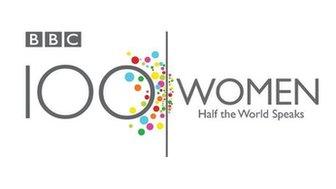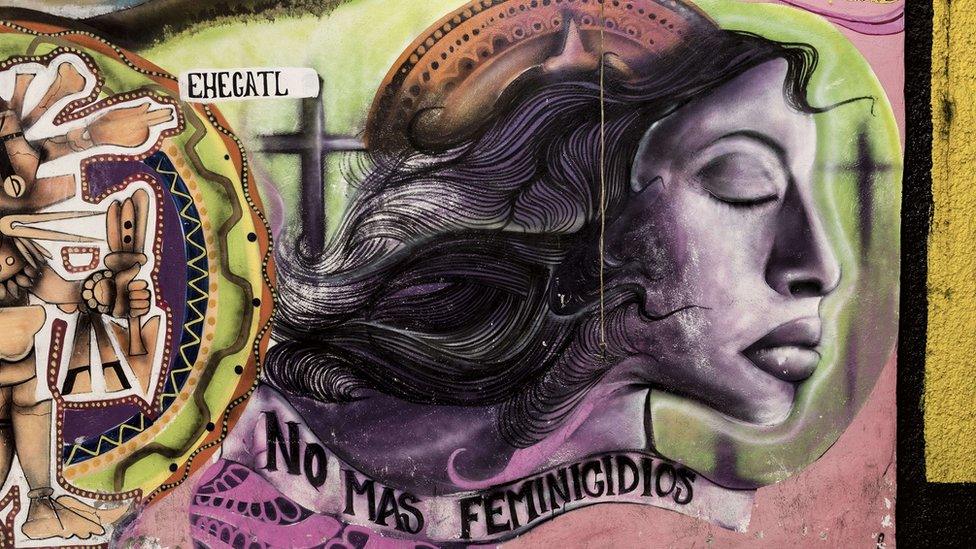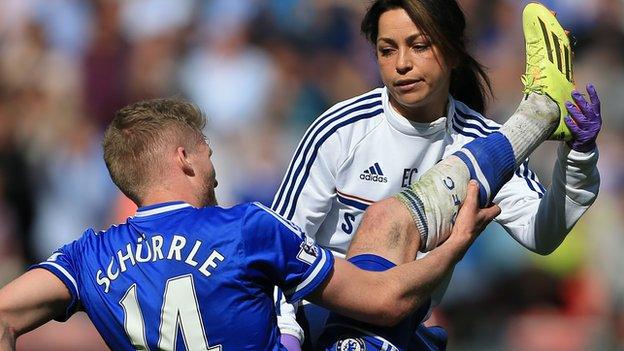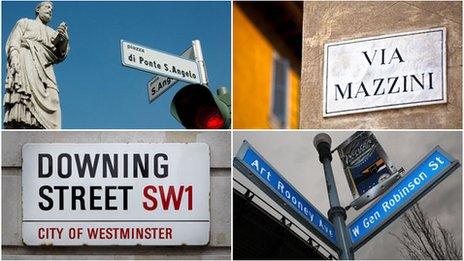100 Women 2015: 'Stop the man's world of sexist words'
- Published

Think twice before you address your workforce collectively as 'guys'
We are all 'just one of the guys' - or maybe not.
It turns out I have been unwittingly saying sexist things for years.
I have not been running around calling women "feminazis" and "bitches".
Unknowingly, though, I have been accidentally reinforcing gender stereotypes - by calling women "guys", describing my deputy as my "right-hand man" (she is definitely a woman) and suggesting my husband "call a man in" to fix a leaky tap.
That is despite editing Stylist, external, a feminist magazine which promotes equality in everything from sport to pay.
OK, so I feel a bit silly now, but it proves a point. There are many ways in which we use gendered language without a second thought.
It is those words and expressions, which we accept as normal, that are the concern.
Powerful words
From the innocuous sounding "hey guys", "manpower" and "oh, man", to the never-withering "mankind", our language is littered with expressions referring to men as the powerful collective.

Bridget Christie says women who question the status quo should not be accused of 'whingeing'
Adjectives used to describe women play a part too.
Bridget Christie, or under her gendered title, The Feminist Comedienne Bridget Christie, writes of this in her autobiography, A Book For Her.
"When a female comic talks passionately about issues, she is perceived as "whingeing" or "moaning", she writes.
"A man doing the same thing is principled, committed and passionate."
She's right.


This year's season features two weeks of inspirational stories about the BBC's 100 Women and others who are defying stereotypes around the world.
Like us on Facebook, external and follow us on Instagram, external using the hashtag #100Women, external.

Adjectives used to describe outspoken women of status are designed to demean: we "yelp", "screech", "bleat", "bitch" and "nag", while men in the same position have "passion", "enthusiasm", "guts" and "force".
I agree with Christie when she says: "I look forward to a time when a woman's voice, publicly expressing an opinion, isn't compared to that of a sheep or a goat."
Language defines us
There are too many examples to list, but I have never heard George Osborne described as a "male MP", nor Michael McIntyre as "a man comedian" nor David Beckham as "a bloke footballer".
Gender does not come into it. Why should it?
With women, it is different. For some reason, we must call Karren Brady a "celebrity businesswoman".
Why does it matter? Why should I not stick with my "hey guys" and concentrate on female genital mutilation and the gender pay gap?
It matters because language defines just about everything we say and do.
If language is a mirror, then the reflection we see says: "Women, we can't see you" or, perhaps even more terrifyingly, "Women, we see you, but you're not like us men."
'The message that men are standard'
Sherryl Kleinman is a lecturer in the Department of Sociology at the University of North Carolina.
In her article, Why Sexist Language Matters, she writes: "All those 'man' words - said many times a day by millions of people every day - cumulatively reinforce the message that men are the standard and that women should be subsumed by the male category.
"'Man' is a high-status term, and women want to be included in the 'better' group. But while being labelled 'one of the guys' might make us feel included, it's only a guise of inclusion."
Kleinman cites an article by the philosopher Douglas Hofstadter, entitled A Person Paper on Purity in Language, in which he evoked an imaginary world where generic terms were based on race not gender.
In it, the word "whitepower" replaces "manpower" and "chairwhite" replaces "chairman".
Through satire, he showed that defining people by gender is as offensive and outdated as defining people by race.
Breeding negativity
Countless studies have shown the impact language has on our development, confidence and status in society.
The words we use can influence, incite us to fight wars, hurt, undermine, demonise and demean.
Subconsciously, they can also influence our mood or our politics.
A Google search on "negative self-talk" produces more than 14 million results for why the activity can create issues with confidence and mental health.
Yet our negative collective vernacular on gender remains unchallenged.
Kleinman concludes: "If women primarily exist in language as 'girls' (children), 'sluts' and 'guys,' it does not surprise me that we still have a long list of gendered inequalities to fix."
That's why I say it is time we collectively call time on gendered language.
If we all chose our words more carefully, we could make a difference to the way women are treated, and reflected, in society.
So let's forget about the "guys" and start talking about "people".
Lisa Smosarski edits the editor-in-chief for Stylist.co.uk, external
- Published20 October 2015

- Published18 August 2015

- Attribution
- Published5 March 2015

- Published11 April 2012
